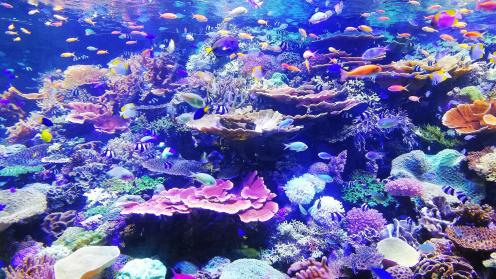Nearly two-thirds of the ocean, along with its unique species and ecosystems, are in areas beyond national jurisdiction. Fragmented legal frameworks have left biodiversity in these areas vulnerable to ever-growing threats, including climate change, plastic pollution, oil spills, overfishing, habitat destruction, ocean acidification, and underwater noise.
On 19 June 2023, after nearly two decades of negotiations, governments adopted a new international agreement to address this issue: the Agreement under the United Nations Convention on the Law of the Sea on the Conservation and Sustainable Use of Marine Biological Diversity of Areas beyond National Jurisdiction (BBNJ Agreement).
One year later, delegates reconvened for the organizational session of the Preparatory Commission for the Entry into Force of the BBNJ Agreement and the Convening of the First Meeting of the Conference of the Parties to the Agreement. Governments and observers stressed the importance of the Agreement and the need to pave the way for its rapid entry into force – possibly by the June 2025 Ocean Conference.
Miguel de Serpa Soares, UN Under-Secretary-General for Legal Affairs and UN Legal Counsel, noted that there is slow but steady movement toward entry into force of the BBNJ Agreement with 91 signatories and 7 ratifications to date. Yet, he added, there is still a long way to go until the agreement gets the 60 instruments of ratification, approval, acceptance or accession needed to enter into force.
Delegates elected the Bureau, but initially did not receive nominations for the Co-Chairs of the Commission from the President of the General Assembly. By afternoon, it was announced that Amb. Janine Coye-Felson (Belize) was nominated as one Co-Chair, but the President of the General Assembly was still consulting on the other Co-Chair. Amb. Felson was elected by acclamation, along with the following Bureau members:
- Japan, Philippines and Singapore from Asia-Pacific
- Latvia, Poland and Romania from Eastern Europe
- Antigua and Barbuda, Brazil and Chile from Latin America and the Caribbean
- Australia, Belgium and Germany from the Western European and Others Group
- Mauritius, Sierra Leone and South Africa from Africa
The Commission adopted the agenda (A/AC.296/2024/L.1) and then heard opening statements. Many called for an inclusive and transparent process and called on countries to contribute to the trust fund to enable experts from developing country capitals to attend the meetings.
Many countries, including Brazil, Cuba, China, the Philippines, Iceland, Indonesia, and Norway, updated delegates on the status of their internal processes to ratify the BBNJ Agreement. A number of developing countries stressed the importance of capacity building, marine technology transfer, and financing to guarantee that countries have the resources, experiences, and capacity to implement the Agreement.
Discussions then turned to the organization of work and the schedule for meetings of the Commission. Delegations shared initial thoughts, largely reflecting elements contained in the Secretariat’s note (A/AC.296/2024/3). Vladimir Jares, Director, DOALOS, announced some possible dates for the Commission to meet in 2025, noting that there may not be funding or time to prepare for a substantive meeting later in 2024, as some delegations had suggested. Co-Chair Felson suspended the meeting for the day and said she would consult with the Bureau.
To receive free coverage of global environmental events delivered to your inbox, subscribe to the ENB Update newsletter.
All ENB photos are free to use with attribution. For the organizational session of the Preparatory Commission for the Entry into Force of the BBNJ Agreement, please use: Photo by IISD/ENB | Pam Chasek.
